This wonderfully warming pork curry recipe is as tasty as it looks. It's made with tender strips of pork loin steak and flavoured with fennel, turmeric and coconut milk, with a fresh hit of crunchy green beans.
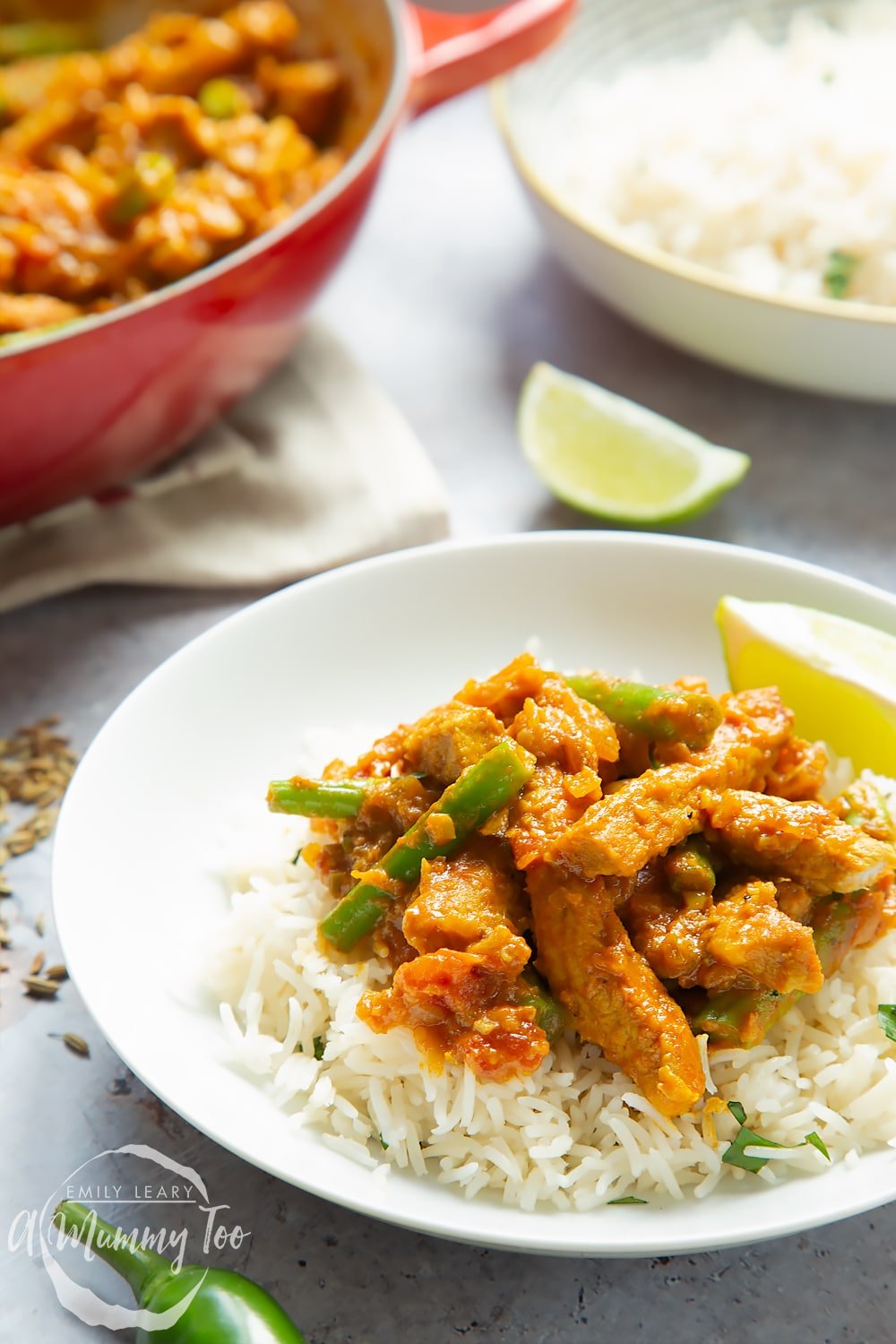
With bold flavours and fragrant spices, Keralan Pandi is one of my all-time favourite Indian curries.
This delicious yet easy pork curry recipe is as tasty as it looks. Tender strips of pork loin, flavoured with fennel, turmeric and coconut milk, with crunchy green beans - perfect combinations if you ask me!
Once cooked, this pork curry has plenty of rich flavour thanks to the spices and the pork, yet it has a relatively mild heat which can be adapted to your tastes, so it should suit even delicate young palates.
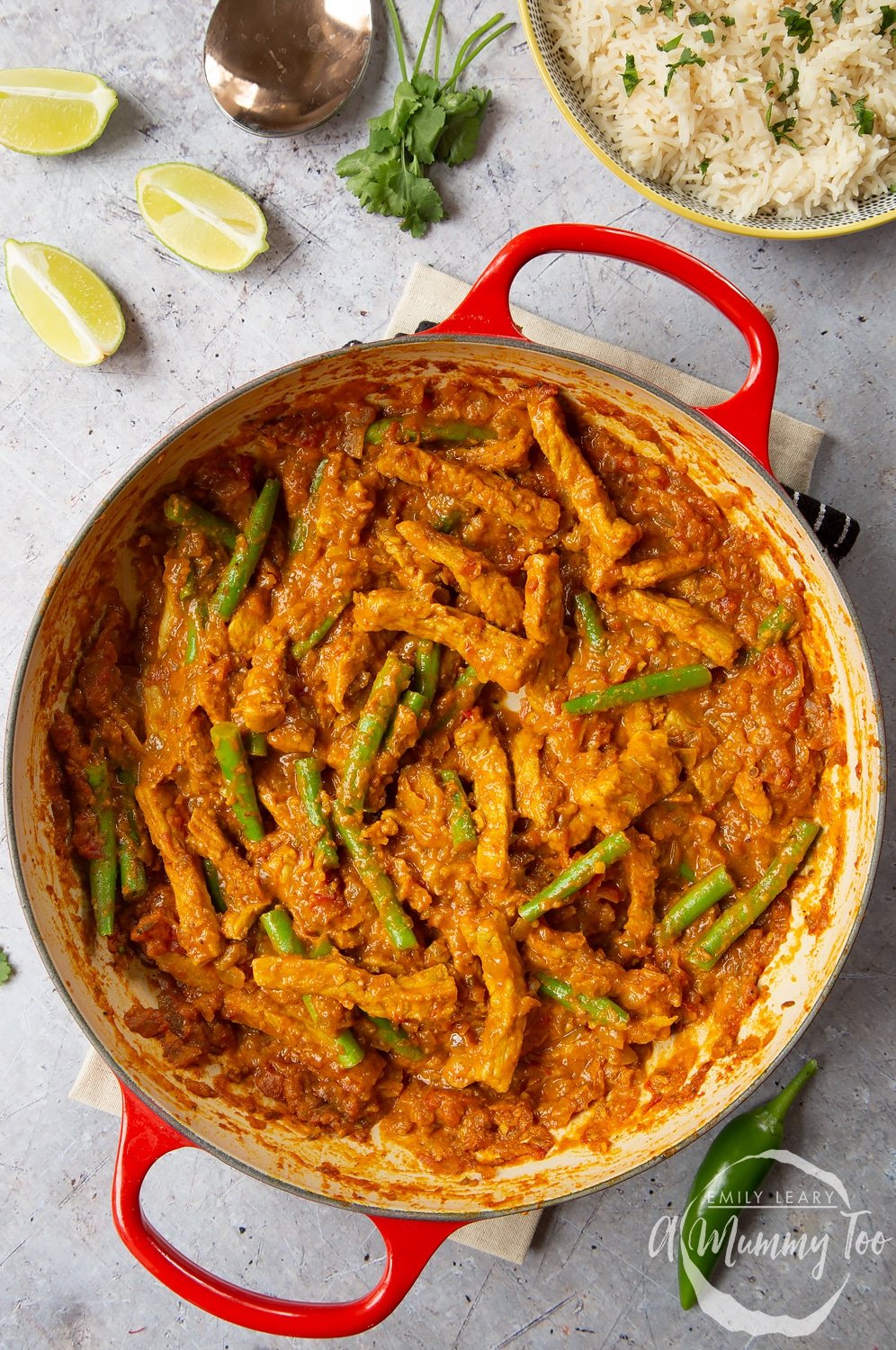
The recipe was created by fabulous Indian chef, Hari Ghotra, who has a real knack for creating delicious, accessible recipes that are easy to cook and perfect for the whole family to enjoy.
Pork is a source of four essential minerals that help the immune system: Vitamins B6 and B12, zinc and selenium. It's also naturally rich in protein, which helps muscle growth.
What's more, pork is easy and versatile to cook with, and pork loin steaks are particularly convenient as they cook quickly. In fact, many pork-based recipes take 30 minutes and under, so they're perfect for mid-week.
Try using pork medallions or loin steaks as an alternative to chicken in your typical mid-week meals, and then go from there.
So, let's make a delicious, quick, easy Keralan Pandi.
Click to jump to a section!
- Is Keralan Pandi Pork Curry easy to make?
- What is Keralan cuisine?
- Ingredients and substitutions
- Equipment and FAQs
- Instructions with step-by-step photographs
- Allergen & dietary information
- How to store, keep, freeze & reheat pork curry
- Full printable recipe
- Fancy some more tasty dishes with a little spice?
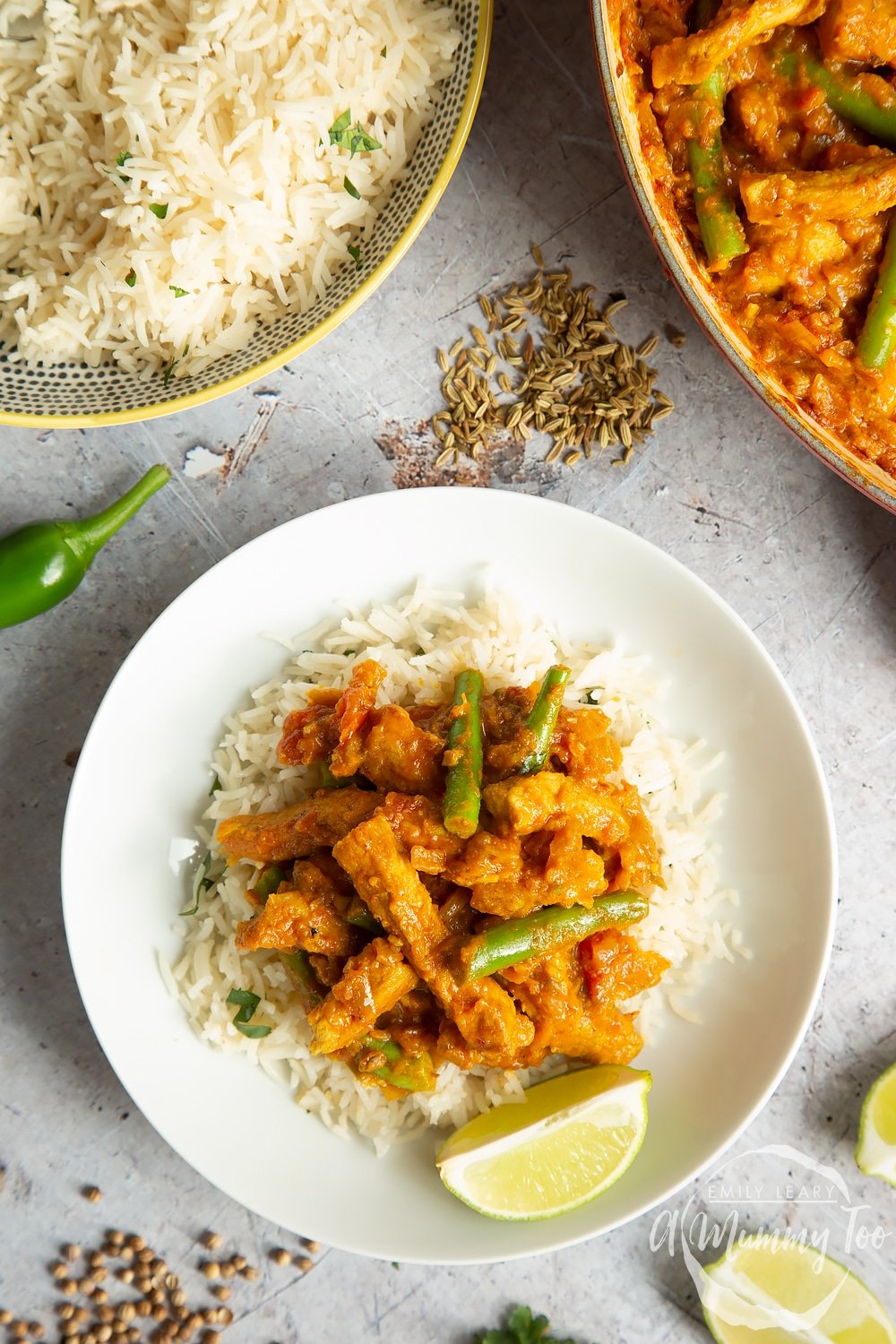
Is Keralan Pandi Pork Curry easy to make?
Considering this recipe's complex flavours, it’s surprisingly quick and easy!
First, you’ll cook your seeds and chillis to activate the flavour and aromatics. Next into the pan is the onions, which you’ll gently cook down until they’re golden brown.
You’ll prepare and season the pork as directed in the recipe card, while the remaining curry ingredients are added to the pan. Then you’ll combine everything in the pan and cook for just a few minutes!
That was just an overview, the full method is below, but it really is that simple. If you do have any questions, feel free to drop me a comment below and I’ll get back to you as soon as I can - happy cooking!
What is Keralan cuisine?
Kerala is a state in the south of India famed for lots of dishes, many of which are vegetarian but often also include fish, chicken and red meat.
Kerala has a rich history in trade, which makes for some amazing flavour combinations and the chillies, coconut and turmeric found in this dish are all staples of Kerala cuisine, along with curry leaves, mustard seeds and tamarind.
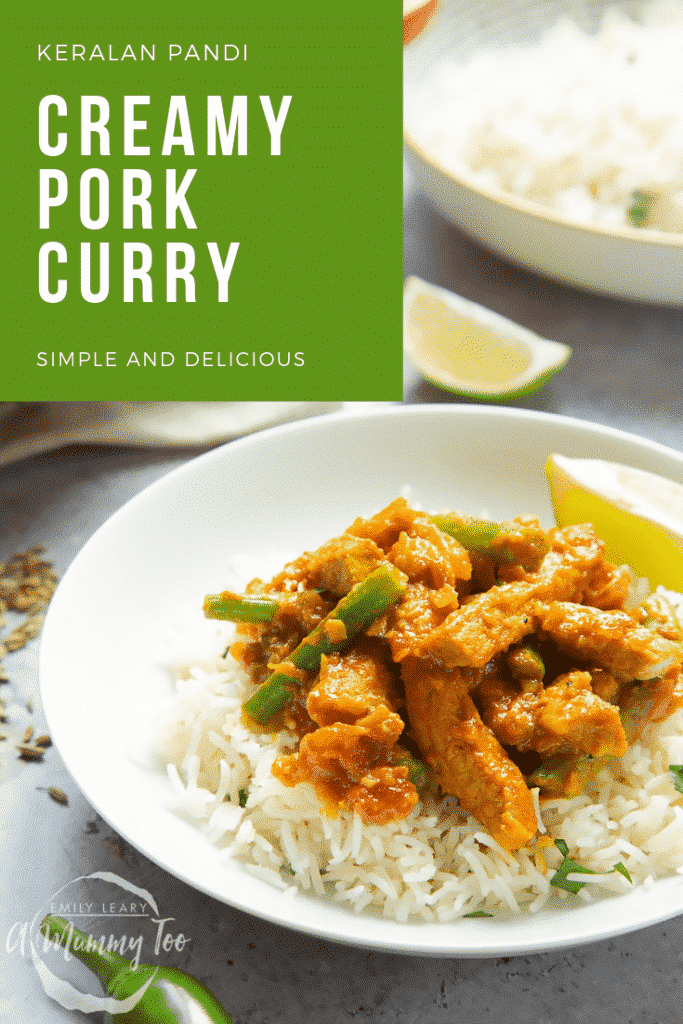
Ingredients & substitutions
- 750 g (1½ lb) pork loin steak or fillet room temperature
- 2 tbsp vegetable oil (canola oil) or coconut oil
- 1 tsp fennel seeds leave out, if preferred
- 2 dried red chillies remove, if preferred
- 2 onion finely diced
- 5 cloves (5) garlic minced
- 1 pinch sea salt flakes
- 1 pinch freshly ground black pepper
- 1 tsp ground turmeric
- 400 g (14 oz) canned chopped tomatoes
- 1 fresh green chilli chopped
- 1 tbsp fresh root ginger grated
- 2 tsp ground cumin seeds or cumin powder
- 1 tsp ground coriander or coriander powder
- 200 g (7 oz) canned coconut milk low fat, if preferred
- 100 g (3.5 oz) green beans trimmed
- 1 handful fresh coriander (cilantro) leaves only, chopped
- 1 lime
Pork
Can I use leftover pork?
You could use leftover meat from a pork roast but it’s best to use fresh pork for a couple of reasons. First, pork has a tendency to dry out quite easily, so cooking it twice isn’t ideal for texture.
Most important is the food safety issue with reheating pork. You’ll need to thoroughly reheat the pork until it reaches an internal temperature of 75C or 165F. Also, you'll need to make sure you only use pork which has been stored correctly.
Can I use a different cut of pork?
If you want to use another cut, like pork belly or shoulder then that’s fine. Though you’ll need to cook the cut according to the packet instructions.
If you buy your meat from a butcher they will be able to give you advice on how to cook each cut, and they may even offer to cut down your piece into a more manageable size. This is especially useful for a shoulder cut.
Pork belly has a beautiful layer of fat which benefits from slow roasting - so you may want to render the fat in a pan first, then roast the pork until almost cooked.
Then you could use the pan with the rendered pork fat to cook the curry sauce and later return the pork to the pan.
Onions
Can I use green onions instead of brown onions?
If you want to use green onions (or scallions) that’s fine, though the flavour is noticeably different to brown onions.
Green onions have a more fresh, ‘zingy’ flavour compared to brown onions. They’re typically used in Chinese, Japanese, Vietnamese and Cambodian cooking.
If you want to add spring onions, you could try taking influence from these cuisines and use ingredients like thai basil or other aromatics instead of the more Indian flavours of cumin and fennel.
Is there a way to speed up the time it takes to cook the onions?
It's important to cook the onions slowly to release the flavours. The slow cooking allows the sugars to break down and bring a subtle sweetness to the onions.
If you’re really pushed for time, you could try running your onions through a grater or food processor to help the sugars break down faster while cooking.
Oil
Could I use olive oil instead of vegetable oil?
You can use olive oil instead of vegetable oil for this recipe, as it doesn’t require an oil with a low smoke point.
If you were deep frying anything in this recipe, olive oil wouldn’t be appropriate.
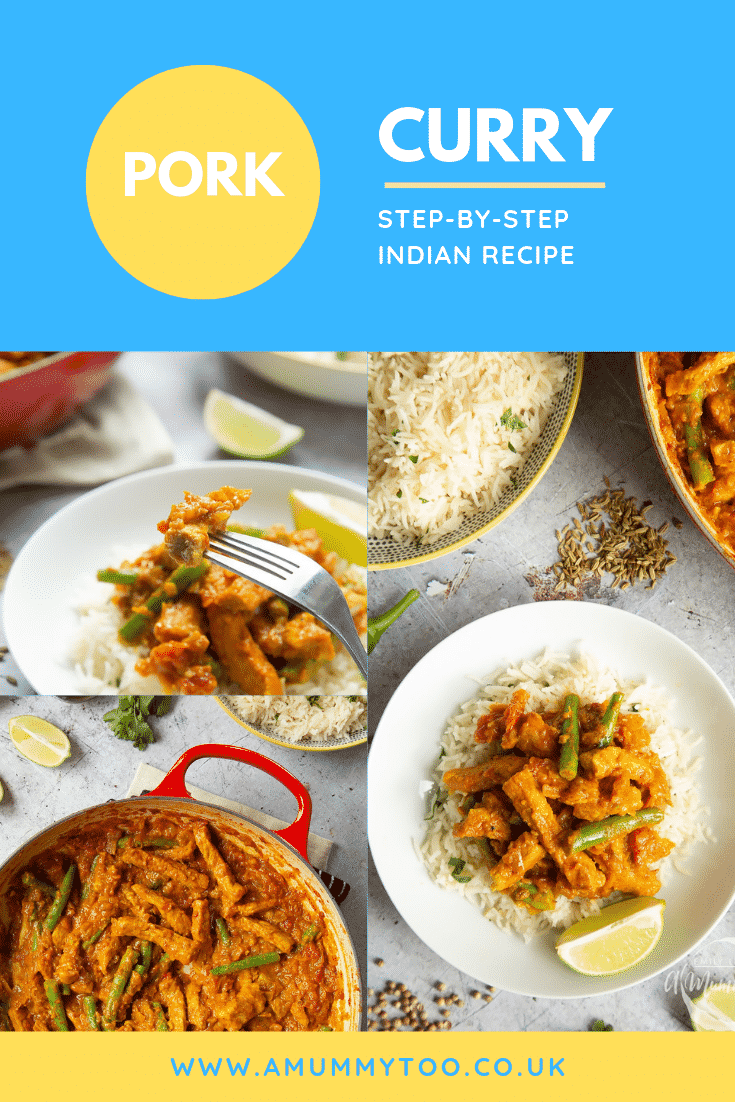
Spices and heat levels
I'm Having Trouble Finding A Spice, What's The Best Place To Find Spices?
All of the spices in this pork curry should be readily available in your grocery store. If you don't have time to get a particular spice, you could leave it out.
If you're ever making a curry with more unusual spices and having trouble locating a certain spice, a good tip is to have a quick search on the internet to make sure it doesn't go by any other names - sometimes you'll find out it's actually been easily available all along!
If that doesn't work, you'll find some in local speciality shops or online retailers like Amazon.
Can I use curry powder instead of the spices listed?
Curry powder has a different flavour to the spices listed in this recipe. So you can use it to make a perfectly good curry, but it will taste different to a Keralan Pandi.
How Should I Store Spices?
To get the perfect curry, you’ll need to use ingredients which are in good condition - and this goes for spices!
If you leave spices open in a cupboard or store them incorrectly, they lose flavour and potency. So to get the best flavour from your dishes, make sure you store spices separately in airtight containers. And keep the containers somewhere cool and out of sunlight.
How Can I Grind My Own Spices?
If you only make curries occasionally, you should be able to pick up a small pestle and mortar in the supermarket for a few pounds that will do the job just fine.
If you're really into making your own spice blends and want a fine grind, you might choose to invest in an electric spice/coffee grinder, which works with much less effort - just don't use the same grinder for coffee and spices! Unless you like the idea of a “cumin latte”.
What other spices could I use?
If you’re trying to use cupboard ingredients, garam masala would work as an alternative to the spices in the recipe. Try using 1-2 tablespoons of garam masala in place of the dry spices and see how you get on.
My Pork Curry Is Too Spicy And Hot, Can I Make It Milder?
Super spicy food isn’t for everyone, luckily you can still get beautifully complex flavours with less or no chillies. So, if you haven't made the curry yet, the easiest way to make it milder is to leave out the red chillis.
If you've already made the curry, making it milder will prove a little more complicated.
There's no way to easily take the heat out of a curry other than to dilute it with other, non-spicy ingredients.
This will change the taste and consistency, but with enough coconut milk and extra veg to counteract the spiciness, you should be able to come up with something milder and still very tasty.
Can I Make My Pork Curry Hotter?
You can, of course, add extra chilli on top of the recommended 2 dried red chillies. This will, however, make the whole dish hotter, which might not be ideal if you are sharing with family members who prefer a milder curry.
Adding chopped chilli directly to a finished curry can add flecks of heat, which can be pleasant, although it won't distribute evenly.
If you want to add heat to just some of the curry once it's made, set it aside in a separate pot, then warm a little oil in a pan and add an additional finely chopped chilli. Fry your chilli for a few minutes, then add to your reserved curry along with the oil it fried in and stir through.
An overhead shot of the creamy pork curry resting on top of a bed of fluffy white rice some raw ingredients scattered over the tabletop - a green chilli and cumin seeds.
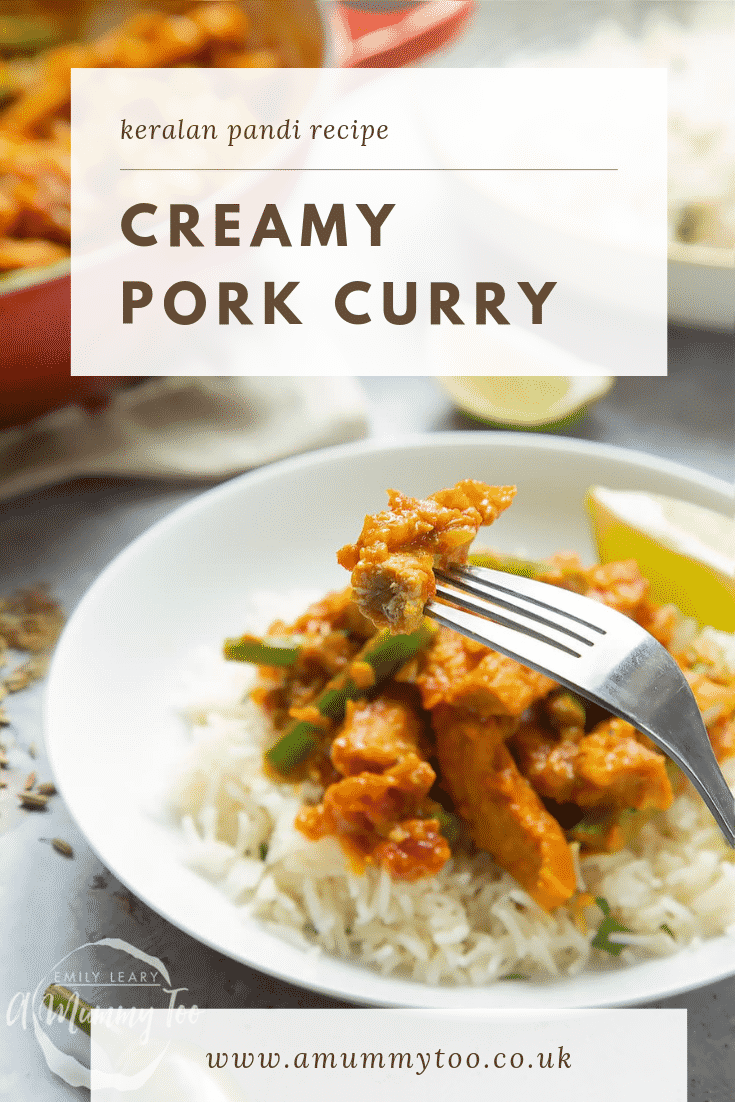
Variations of Keralan Pork Curry
Can I Use Chicken, Shrimp Or Lamb Instead Of Pork In A Keralan Pandi?
Yes, this Keralan Pandi is very adaptable and works with lots of different meats.
To ensure your curry is both tasty and safe to eat, make sure your meat of choice is cut to an appropriate size and fully cooked through.
Can I make Keralan Pandi in a different quantity?
Sure! I used just shy of 200g of pork per person. So you can use that measurement to add more or less meat. An online recipe calculator is a good way to work out the quantities for different quantities of the curry sauce ingredients.
Can I add stock to the recipe?
There's enough water released from the tomatoes and in the coconut milk, but if you feel it's dry, you could add just enough water to loosen it. Extra stock could make the curry too salty, so proceed with caution.
Do I have to use pork stock in a pork curry, or can I use chicken stock to add flavour?
I find that chicken stock works really well with pork, as it’s lighter than beef and more reminiscent of pork. So if you are adding stock, chicken stock would be a good option.
How can I change or add flavour to this recipe?
First, when adjusting the flavour, make sure it's seasoned to your liking. Some people swear by kosher salt as a simple way to bring more flavour to a dish than table salt tends to lend.
If you want to add a more savoury and umami flavour, you could use soy sauce or fish sauce instead of salt.
You could even make this curry inspired by different cuisines. For example, if you wanted to make it more like a Japanese curry, you could breadcrumb and deep fry the pork and serve it on top of the curry similar to a pork katsu.
To do this, you would dip your pork strips into some flour, then dip the floured pork into a bowl of egg, then roll it in some breadcrumbs. Lower the coated pieces into some hot oil using a slotted spoon or spatula. Cooking time will depend on the size and thickness of the pork so look for a Pork Katsu recipe for further guidance on cooking pork like this.
The best breadcrumbs to coat your pork would be panko breadcrumbs, as it is traditionally used in katsu. You can buy panko breadcrumbs at a large supermarket or Japanese market.
Or you could add more of a Thai or Vietnamese flavour by swapping out the fresh coriander for a herb like Thai basil. It’s more fragrant and has a slightly different flavour to sweet Italian basil.
For a different texture (and extra vitamins), you could use bell peppers or other vegetables. Add slices in similar size to the pork, or chop into 1-inch pieces.
Could I tweak this recipe to make it more like a pork vindaloo?
Vindaloo is another kind of Indian pork curry originating from Goa, which is just north of Kerala.
A vindaloo is fragrant pork curry, typically made with pork marinated in vinegar, as it originates from a dish made by Portuguese sailors using preserved meat. Vindaloo also contains no coconut milk, so it has a different texture and more fragrant, intensely spiced flavour. So while they’re both awesome recipes for pork curries, they do have some key differences.
If you want to make your pork curry more like a vindaloo, you would need to adjust the preparation time by marinating your pork overnight, covered in the spices mixed with 100ml palm vinegar (traditionally used in Vindaloo).
Then when it comes to cooking, follow cooking instructions and swap the coconut milk for an equal amount of chicken stock.
It won’t have the classic flavors of a vindaloo, but it will be more similar than the original recipe.
Can I Make The Keralan Pandi Paste Now To Use In Curries Later?
Onions and spices frying to a paste in a frying pan as the base for the Keralan Pandi - South Indian Coconut-Pork Curry
Yes! The base of this curry is a delicious blend of very gently fried onions and spices. If you like, you could make a big batch of this curry paste and freeze into portions.
Then, if you're planning ahead, you could defrost a portion of the past and cook with tinned tomatoes, green chilli, grated ginger, coconut milk, pork and beans whenever you like.
A fork is holding up a strip of the pork which has been taken from a bowl on the table, this trip has been bitten into and shows how tender it is.
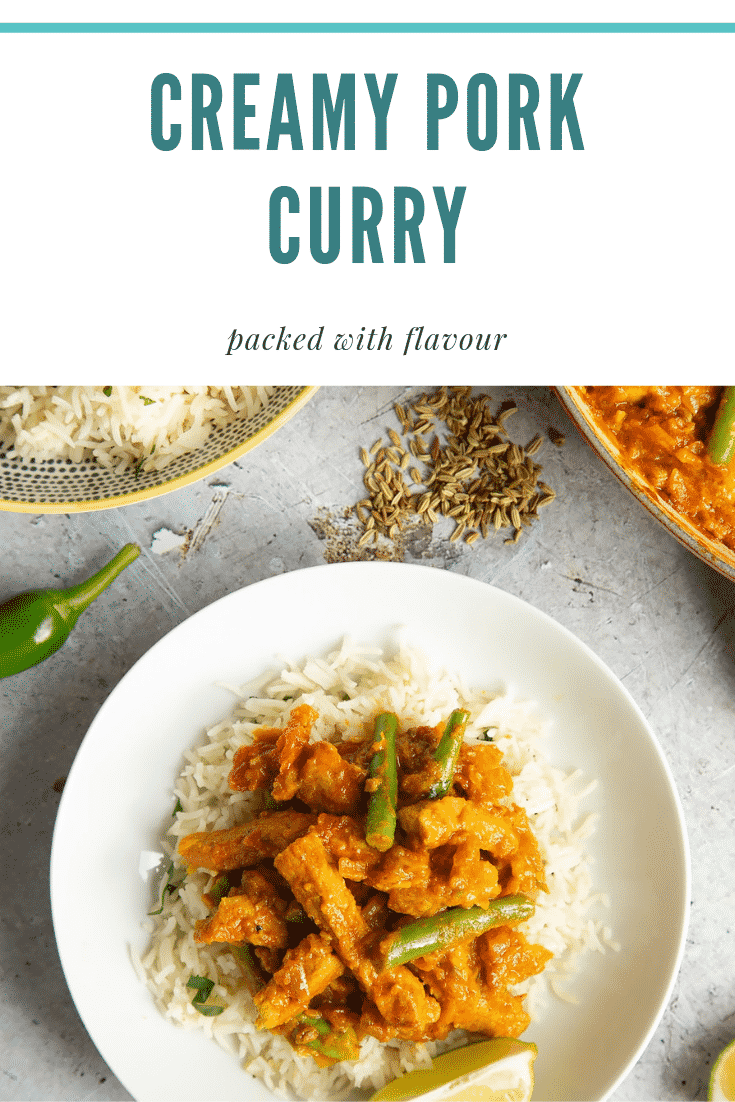
Equipment & FAQs
Will I need any special equipment to make Keralan Pandi?
This is a really easy curry recipe, you’ll only need one pan and a spoon for cooking, and a chopping board, knife and mixing bowl for prep! You’ll also need some scales or measuring spoons to measure your ingredients.
There's always a complete list of suggested equipment on the recipe card and you'll find them below too
Could I make this recipe in my slow cooker?
A slow cooker is perfect for cooking pork, as it helps keep the meat moist. For a slow cooker, using pork loin would be better than fillets.
The best way to cook this recipe in the slow cooker would be to rub the loin in the spices and leave it overnight in the fridge in an airtight container. This helps hydrate the spices and lets the meat become infused with the flavour before slow cooking.
The next day, add the meat, onions and remaining ingredients to the slow cooker set to low.
According to the BBC it takes around 4 hours to cook a pork loin on this setting. You may need to top up the liquid with some stock or water.
Instructions with step-by-step photographs
Place a wide, large saucepan or large frying pan over a medium heat and add the oil.
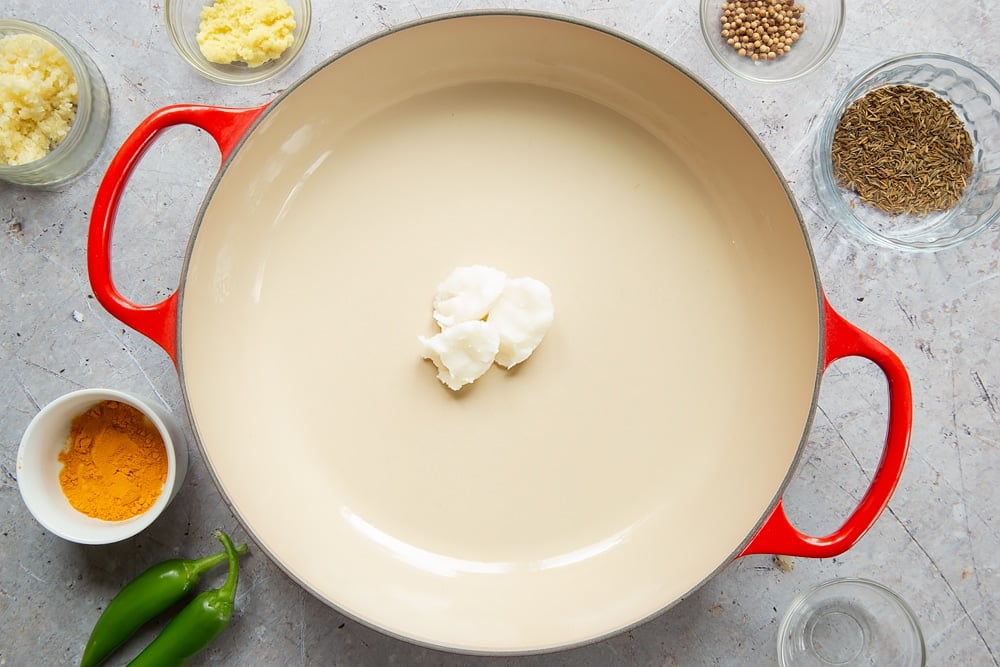
Once hot add the whole fennel seeds and red chillies (if you are using them).
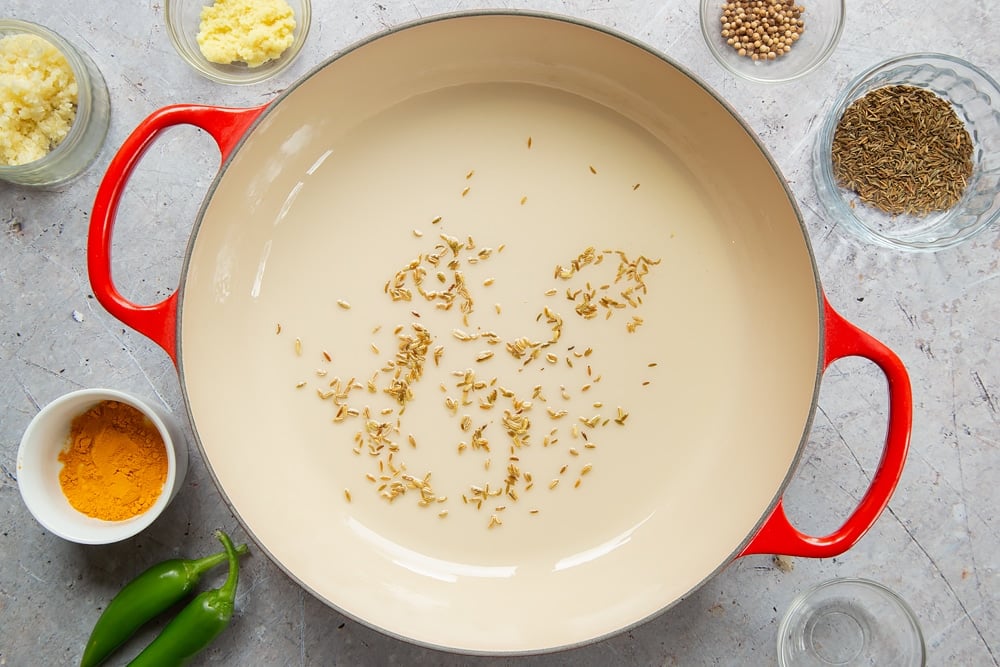
Add the onions and sauté until they start to brown. You'll probably need to lower the heat to ensure they brown gently rather than stir fry.
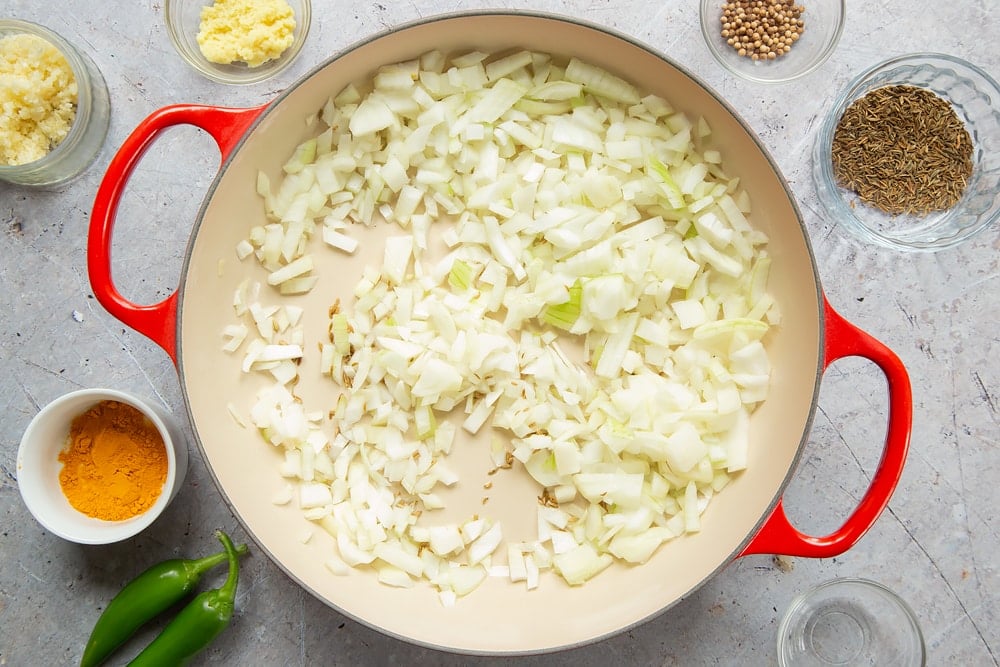
Then add the minced garlic cloves.
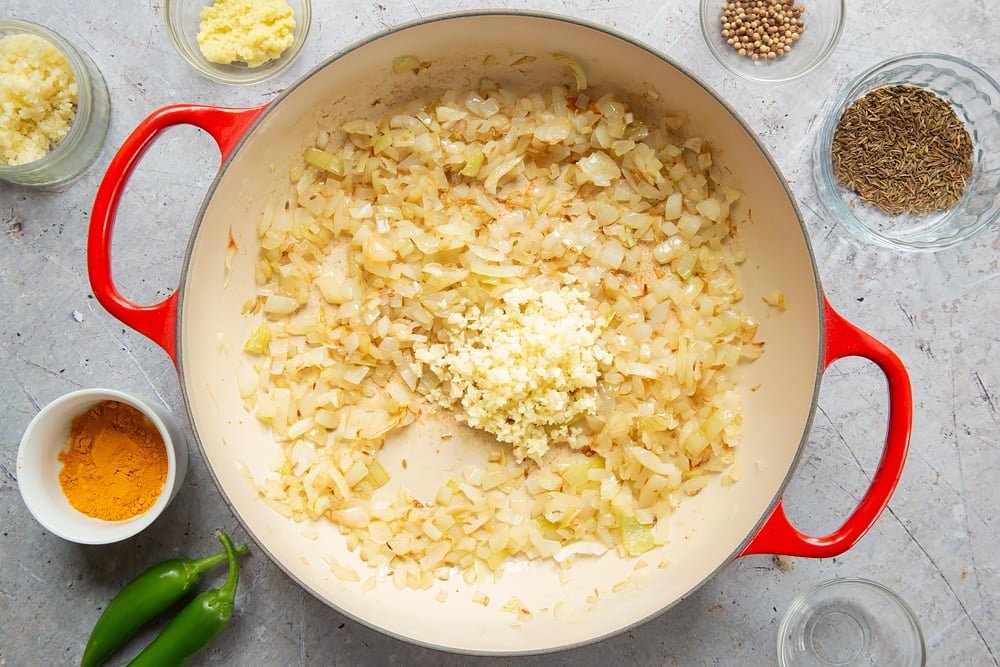
Continue to sauté for another minute.
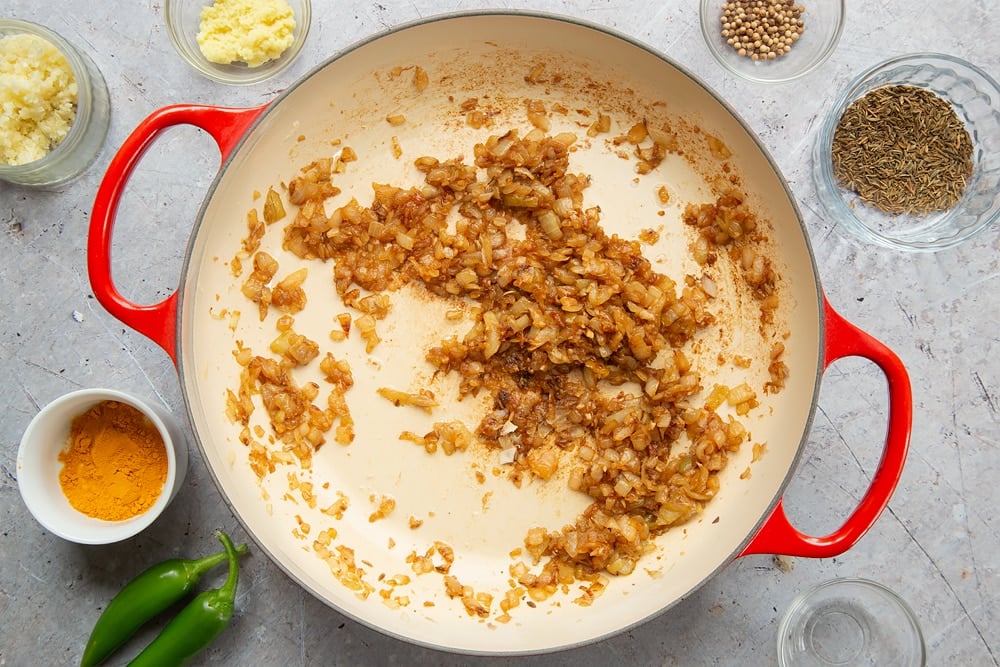
Remove the fat from the pork.
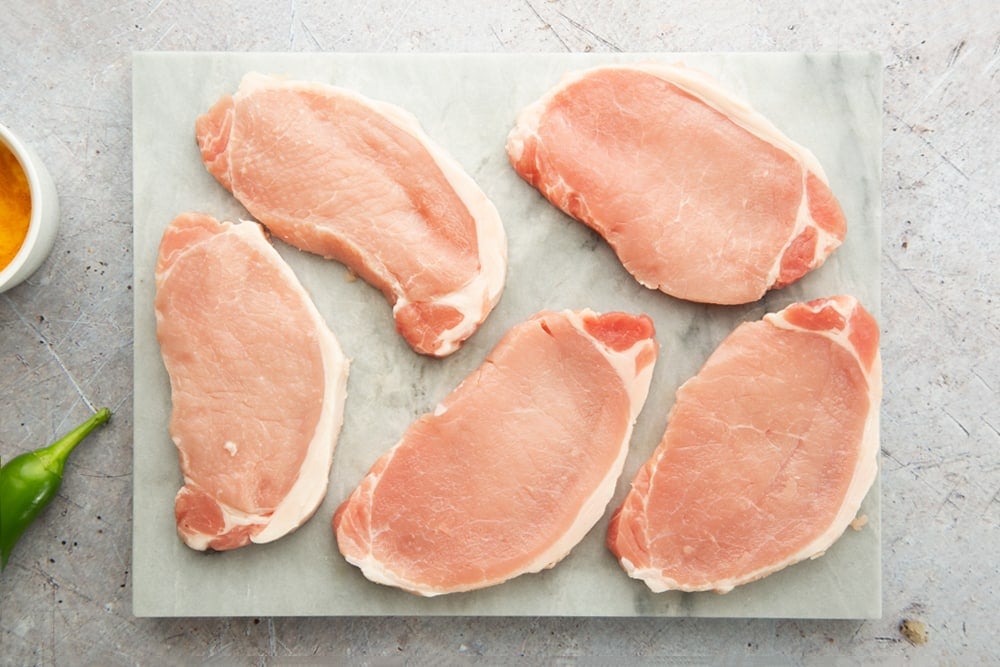
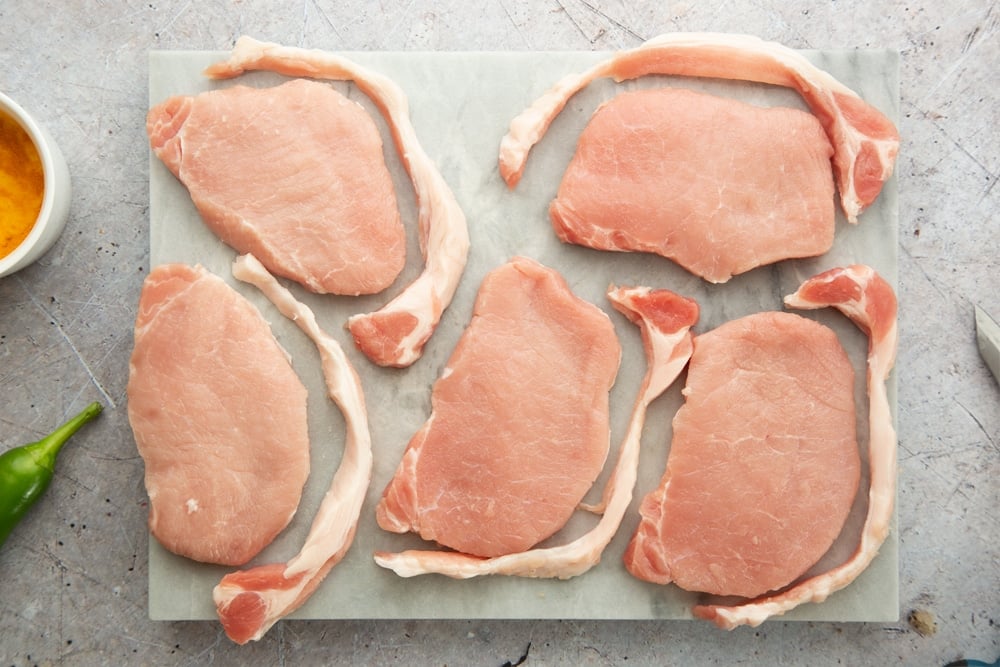
Cut the pork into strips.
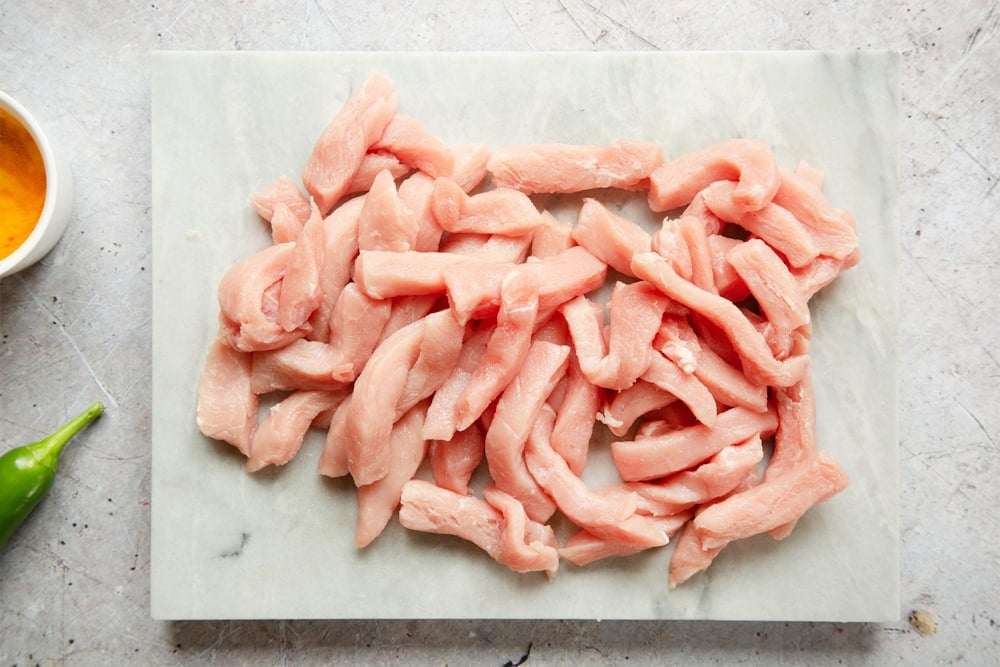
Season the pork with salt and lots of black pepper and ½ tsp turmeric.
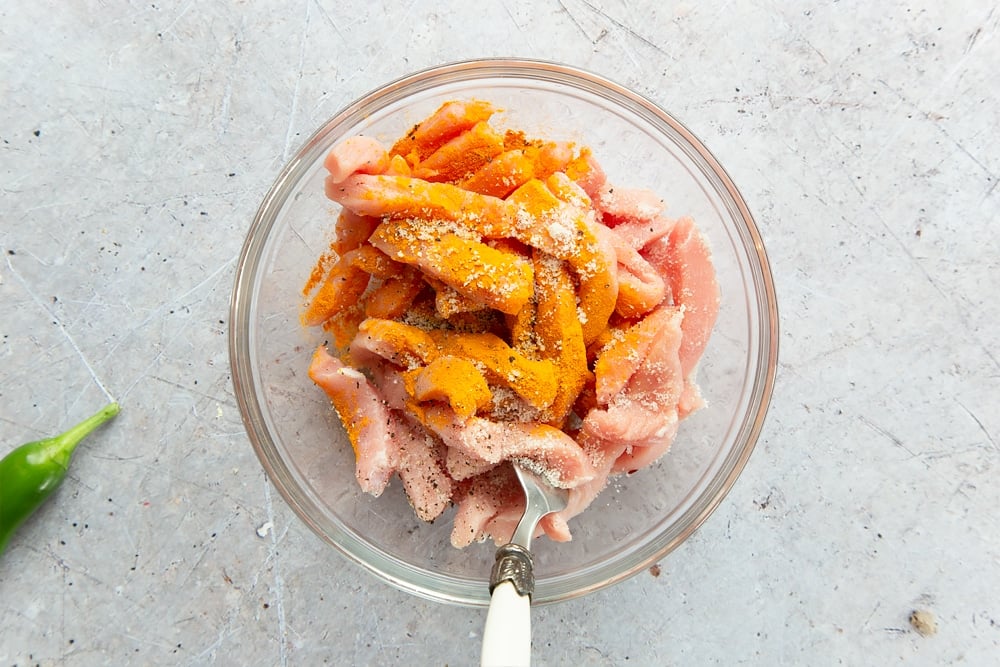
Stir until the pork is evenly coated in the spices.
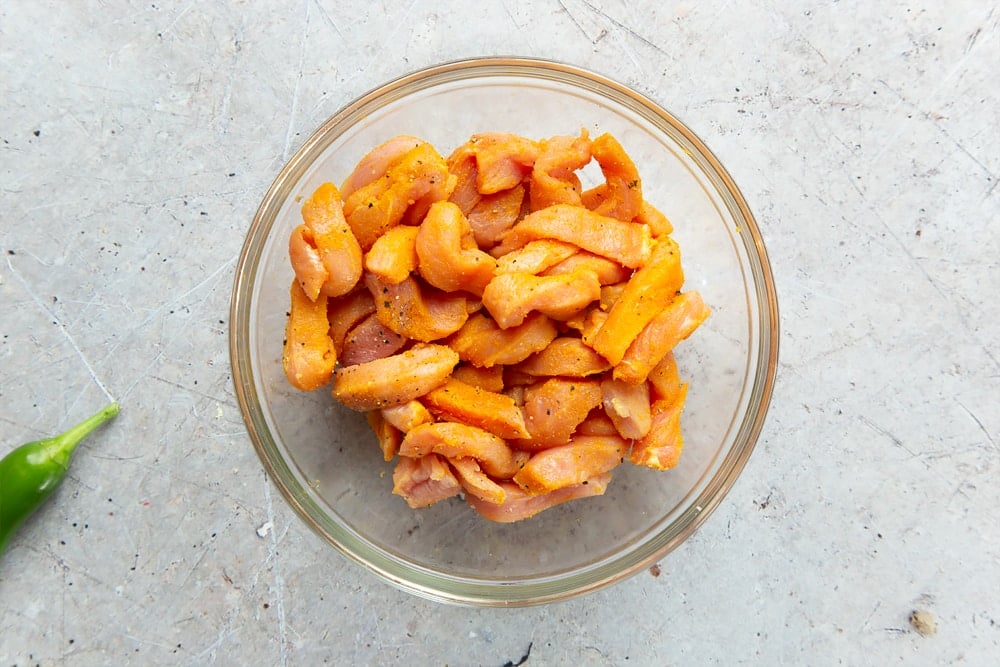
Add the tinned tomatoes, green chilli, grated ginger into the pan with the onions.
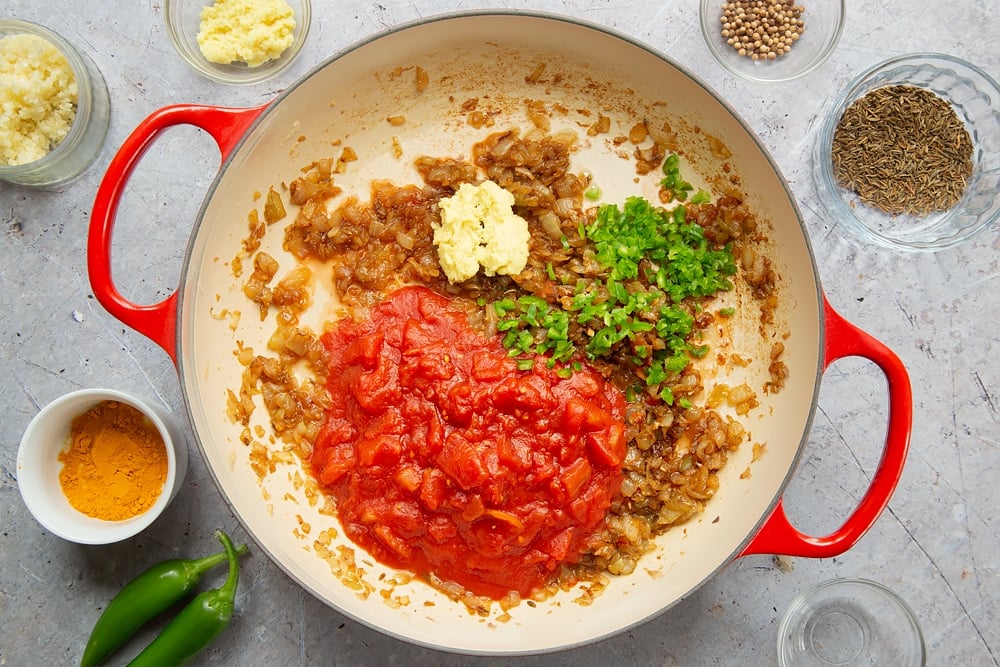
Stir over a medium-high heat.
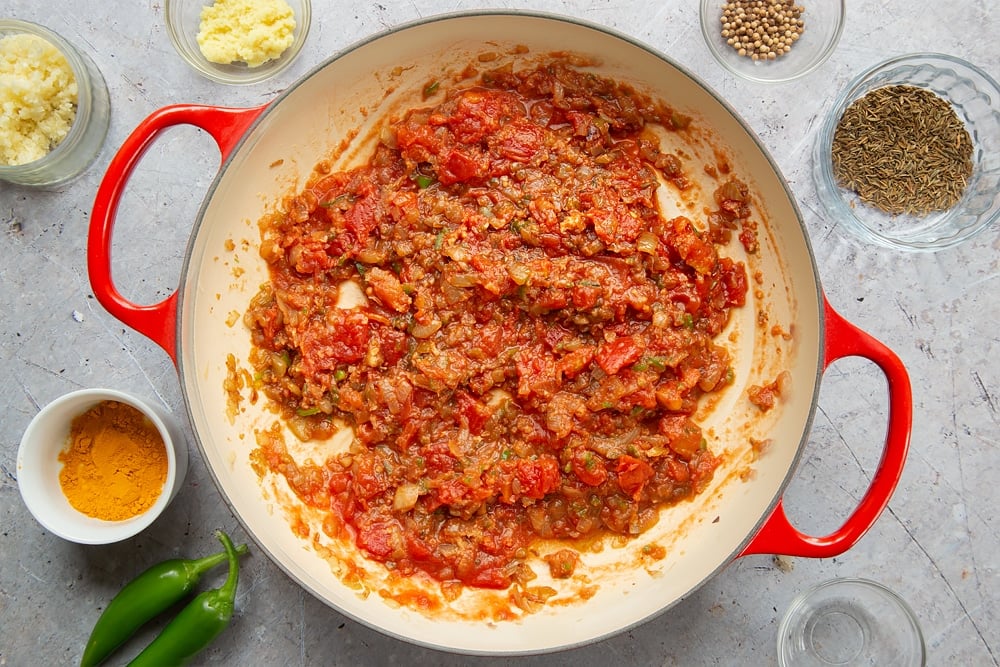
Once it starts to simmer, add the remaining turmeric, ground cumin and coriander and stir.
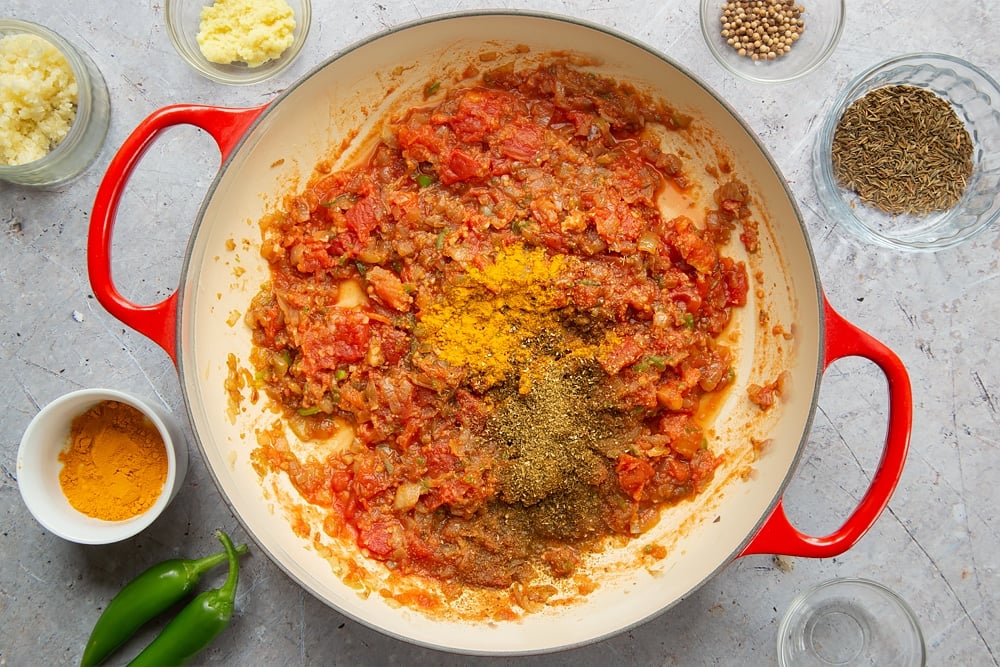
Let it reduce and thicken.
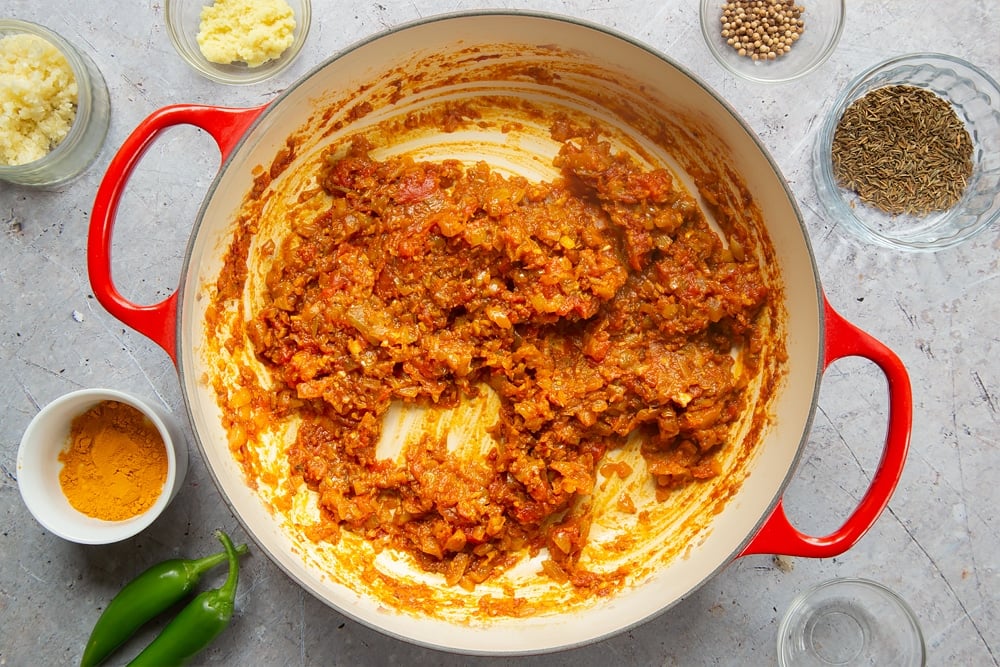
Add the meat and stir to coat with the sauce.
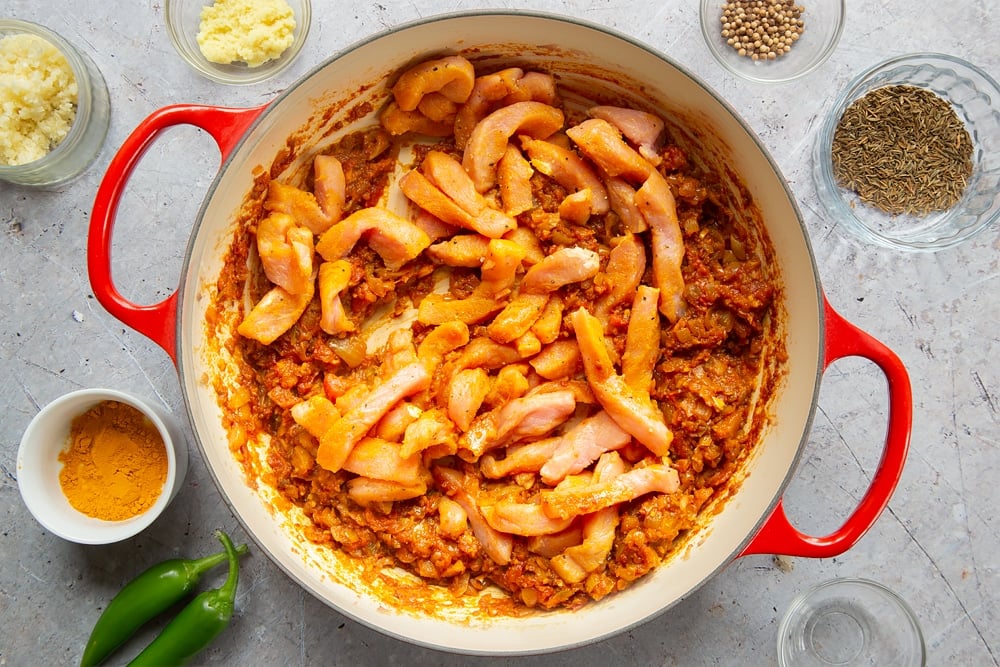
Reduce the heat and cook for 5-10 minutes.
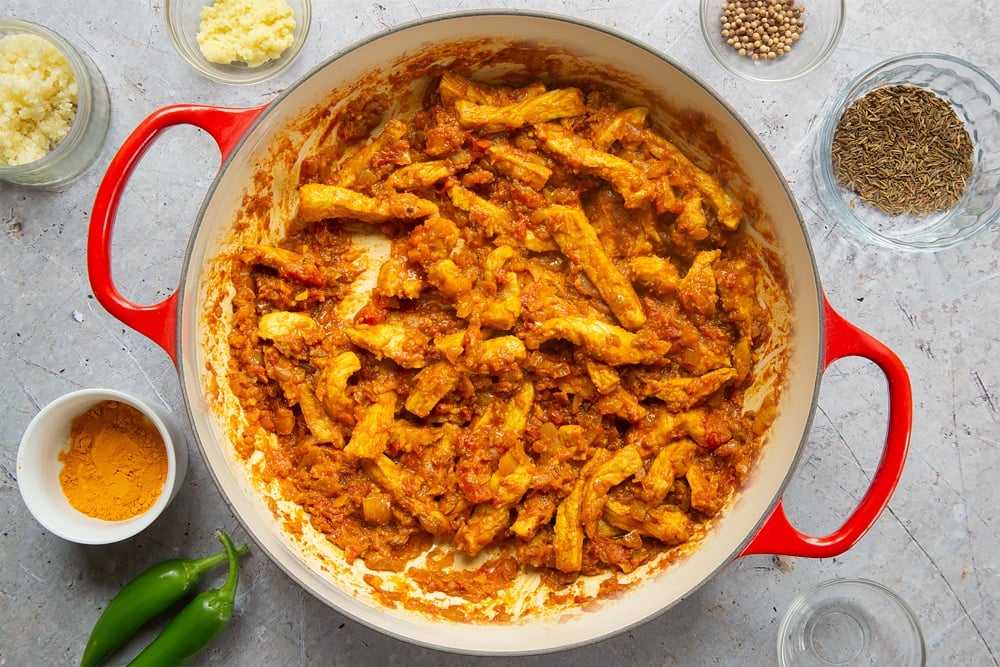
Pour in the coconut milk.
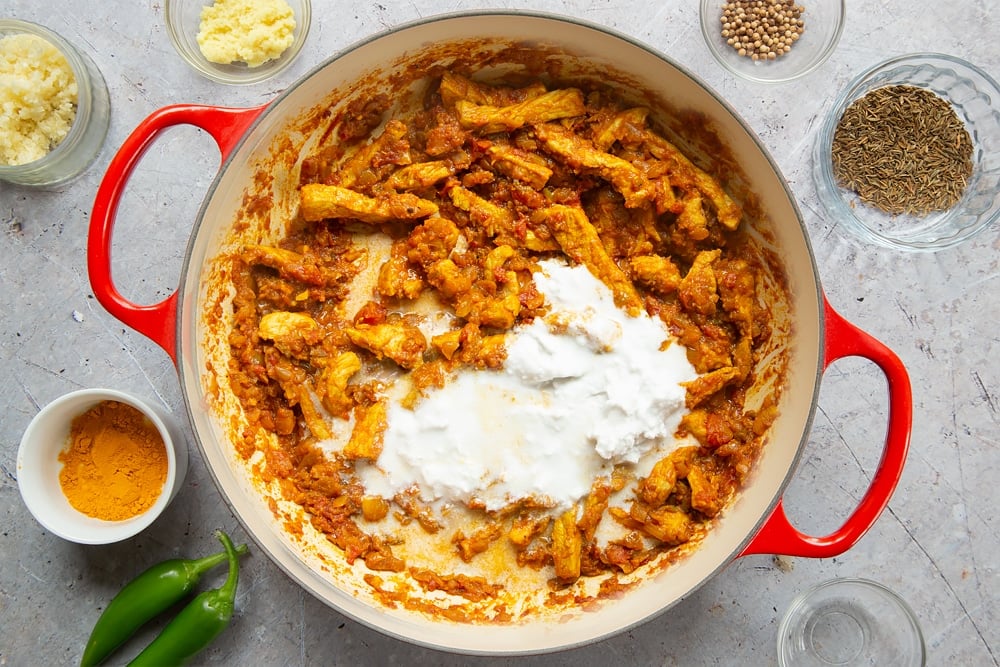
Heat through.
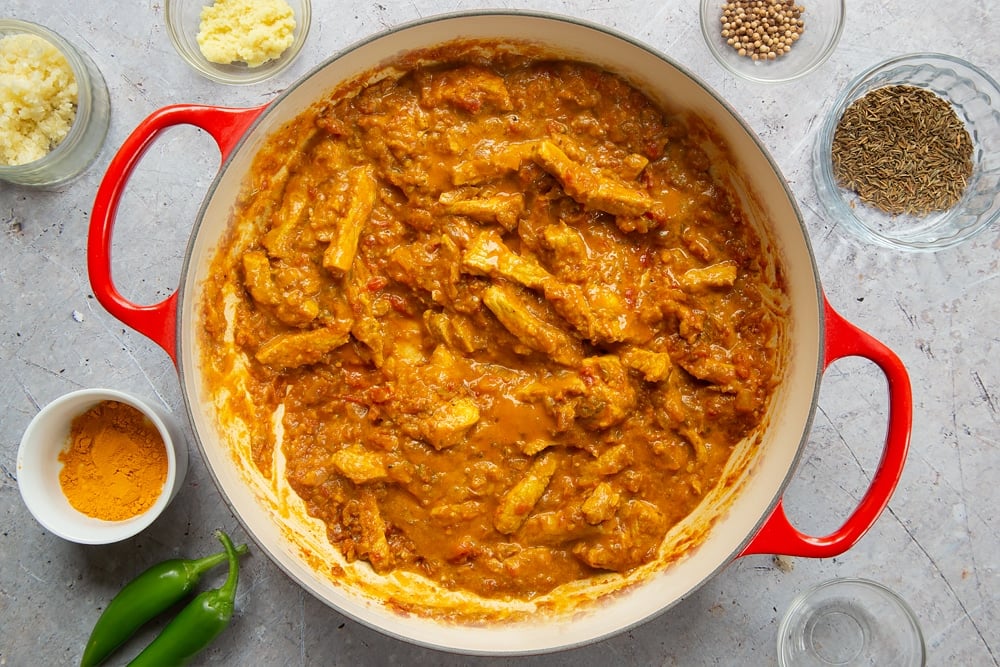
Add the trimmed beans.
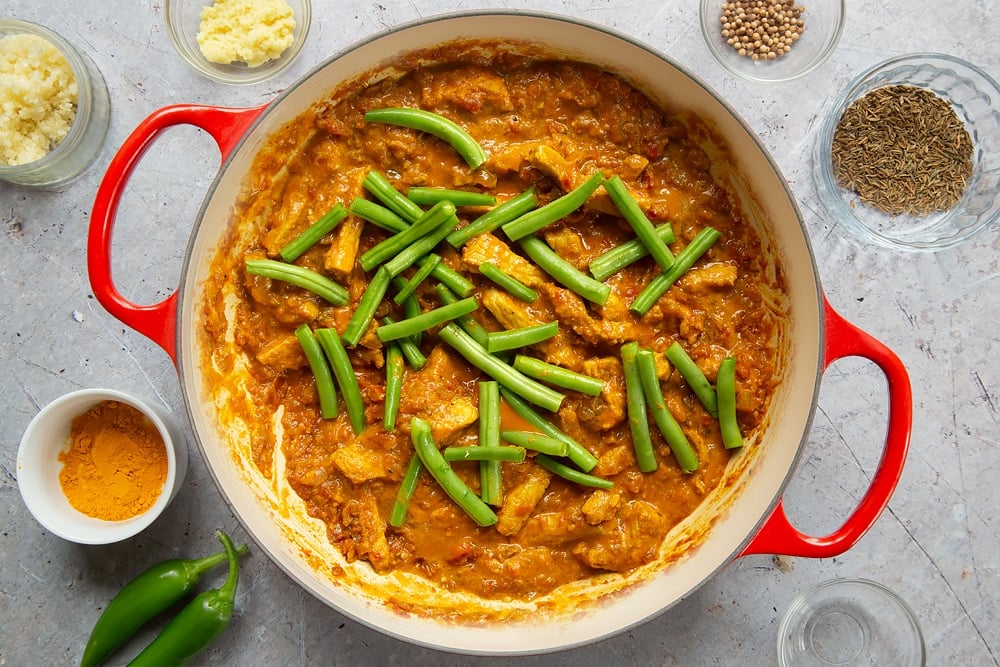
Cook for a further 5-10 minutes until the beans are cooked.
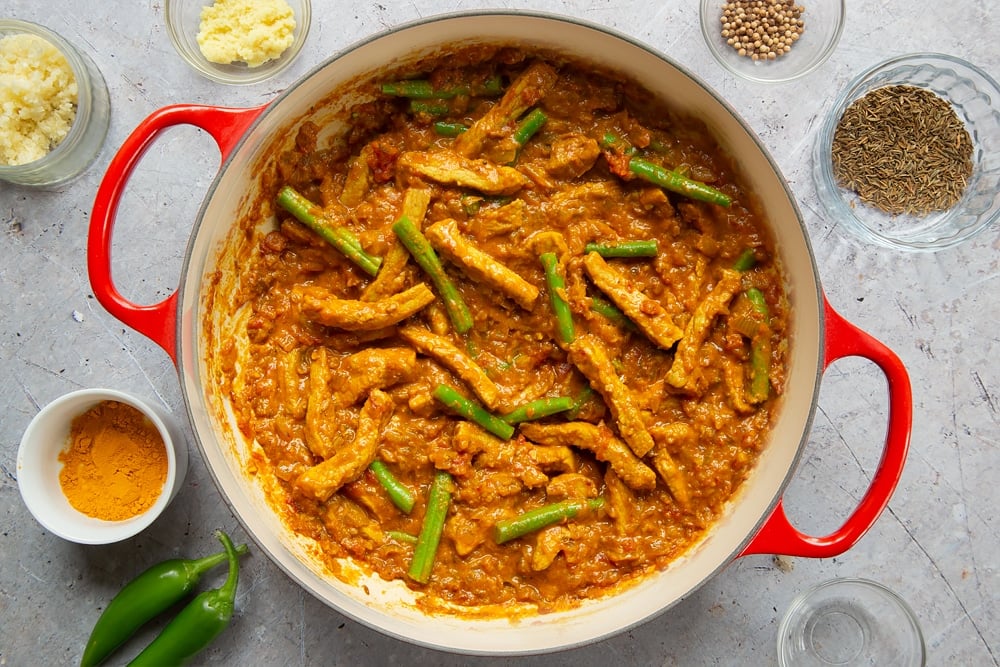
When cooked through, check the seasoning and add the coriander leaves (fresh cilantro leaves), and a squeeze of lime.
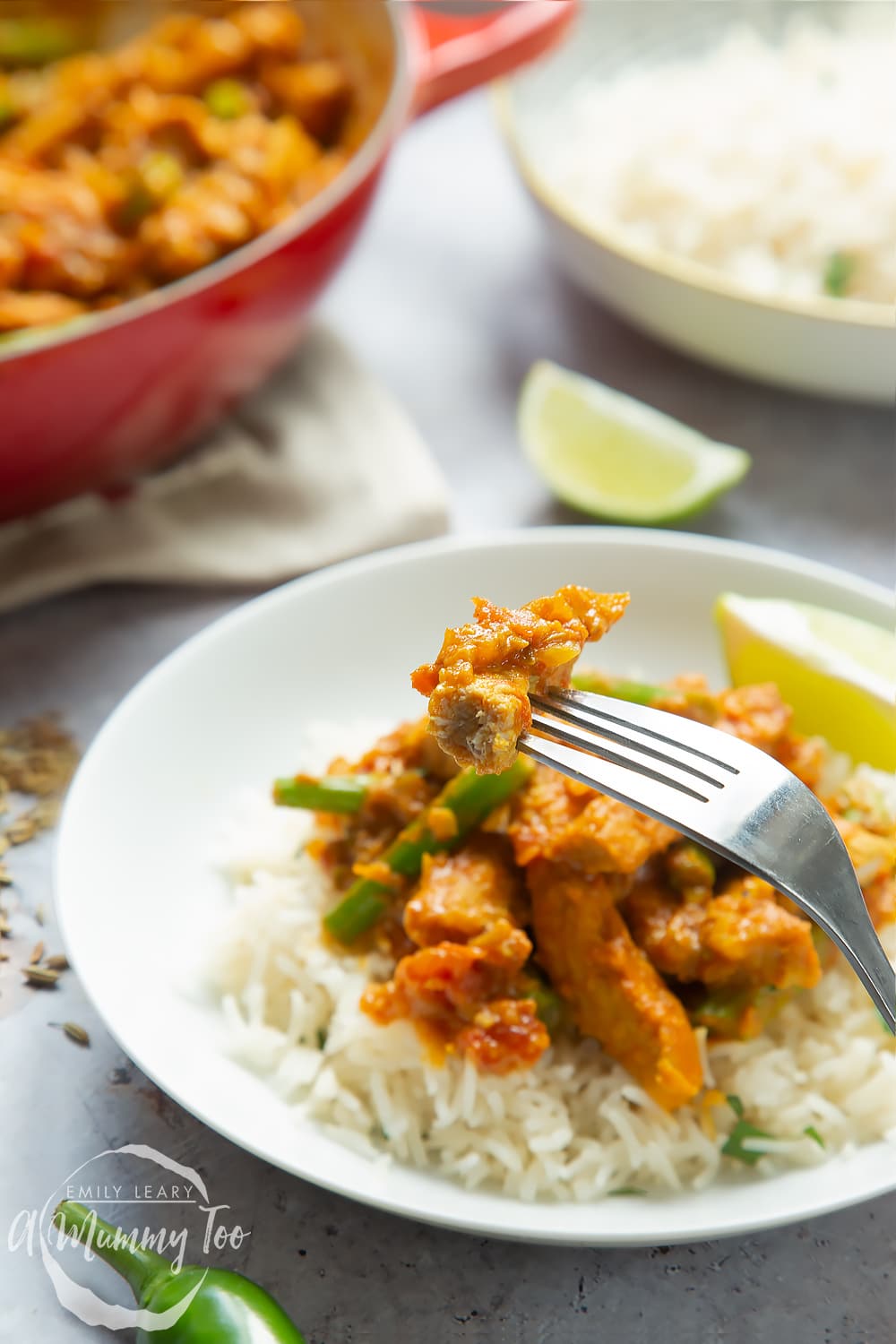
Allergen & Dietary Information
- Is This Keralan Pandi Curry vegetarian?
- Is This Keralan Pandi Curry vegan?
- Is This Keralan Pandi Curry Gluten-Free?
- Is This Keralan Pandi Curry suitable for a keto diet?
- Is This Keralan Pandi Curry suitable for a low FODMAP diet?
- Is This Keralan Pandi Curry suitable to eat while pregnant?
- Is Keralan Pandi Pork Curry suitable for babies and toddlers?
- Is this Keralan Pandi Pork Curry healthy?
Is This Keralan Pandi Curry vegetarian?
Sorry, this curry contains pork so it is not vegetarian. You could try making a version with tofu or a meat alternative. I’d recommend adding some extra stock or salt to compensate for the loss of flavour without the pork.
Is This Keralan Pandi Curry vegan?
The only ingredient in this recipe that isn’t vegan is the pork. So you could swap it out for tofu or a vegan meat alternative.
Again, you would need to add some extra stock or salt to compensate for the loss of flavour without the pork. A vegan fish sauce could work well for adding flavour to a vegan version.
Is This Keralan Pandi Curry Gluten-Free?
Yes, this pork curry is naturally gluten-free!
Just be aware that some dried spices can contain traces of gluten so, as ever, check the label of all of your ingredients before you start cooking.
If you decide to add stock, make sure it is a gluten-free version.
Is This Keralan Pandi Curry suitable for a keto diet?
This recipe is suitable for a ketogenic diet. Pork and coconut milk are high in protein and fat and low in carbs. Green beans are also a good vegetable for a keto diet.
Tomato is the only ingredient which would cause an issue, so if you’re keto you may want to think of a workaround.
Though the amount of tomato per serving is probably within manageable range for staying in a state of ketosis.
Is This Keralan Pandi Curry suitable for a low FODMAP diet?
While pork is considered low FODMAP, a few other ingredients (including coconut milk and tomato) are considered high in FODMAPs.
Some say tinned tomatoes are better for a low FODMAP diet. However, it’s always safer to speak to your nutritionist or doctor to understand how this meal might fit with your needs.
Is This Keralan Pandi Curry suitable to eat while pregnant?
Yes, this recipe is completely safe to eat while pregnant, as long as you prepare it safely and hygienically.
It’s safe to eat pork while pregnant, as long as it has an internal temperature of 75C or 165F. So if you’re worried, it might be a good idea to invest in a meat thermometer.
A Mummy Too does not offer medical advice. Please seek help from a medical professional if you need further information or have any concerns.
Is Keralan Pandi Pork Curry suitable for babies and toddlers?
Once your child is eating solids, you can feed them meat like pork (but not bacon). However, this curry contains chilli and salt.
Salt is bad for young children as it is difficult for their kidneys to process. And chilli is just a lot to handle for a baby!
So you may want to make some adjustments to the recipe if you are making it for the whole family.
Always give food in an appropriate size and shape for your baby or child. Cut small, round foods, like grapes and cherry tomatoes, into small pieces.
Always keep babies supported upright while eating and supervise your baby when they’re eating in case they start to choke.
A Mummy Too does not give medical advice. Please speak to a health professional if you have any questions or concerns.
The NHS has some fantastic resources on their website on what to feed babies and young children.
Is this Keralan Pandi Pork Curry healthy?
Health is a relative term! So this dish isn’t suitable for some people, but overall, this Keralan Pandi Pork Curry is generally considered one of the healthy recipes!
Pork isn’t the leanest meat, but the loin or fillet used in this recipe is leaner than pork belly.
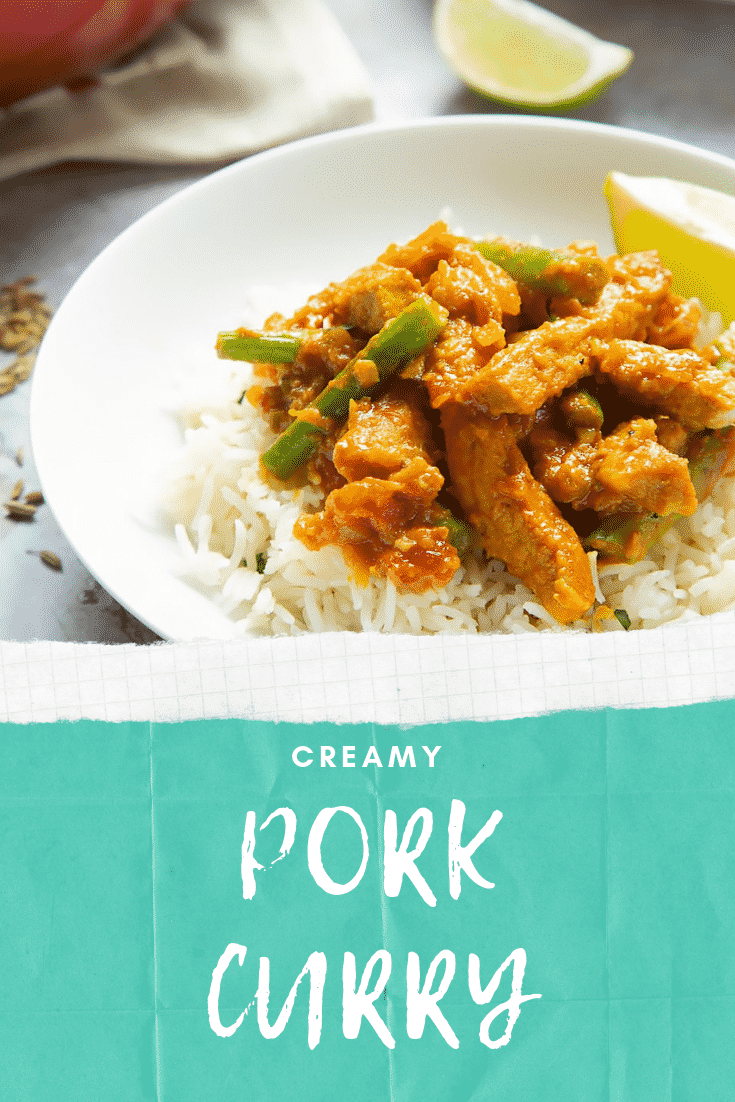
How to store, keep, freeze & reheat pork curry
Can I leave Pork Curry out on the counter?
No, you should refrigerate or freeze this curry to keep the pork from spoiling.
How should I store Pork Curry?
The best way to store pork curry is to place it into a plastic container or portion it into sandwich bags. Then either refrigerate or freeze the plastic container or bags.
Don’t forget to label the container with the date you made the curry. Pork keeps for around 3 months in the freezer, any longer and it begins to lose flavour.
Can I Refrigerate The Pork Curry?
Yes, you can refrigerate this pork curry, as long as it has been cooled and placed in an airtight container in the refrigerator within 2 hours of cooking.
In the fridge, this curry will last up to 3 days. In the freezer, it will last up to 4 months.
Can I Freeze The Pork Curry?
This pork curry also freezes quite well, and again you will need to ensure it is placed in an airtight container in the freezer within 2 hours of cooking.
To eat, reheat from frozen.
A curry that has been frozen and defrosted should retain most of its texture and flavour, but you may find that it loses a little potency of the spices.
Can You Reheat A Keralan Pandi And Other Pork Curries?
A shallow bowl of creamy pork curry rests on top of fluffy white rice, there is a slice of lime to accompany it.
Yes, as long as it's been stored correctly (cooled and placed in an airtight container in the refrigerator or freezer within 2 hours of cooking - see below), then microwaving your pork curry to reheat it should work fine. Heat in blasts of 1-2 minutes, taking a break to stir to ensure the dish heats evenly all the way through.
If you prefer, you can reheat your Keralan Pandi on the hob. Add your pork curry to a saucepan with a tablespoon or two of water, cover with a lid and cook over a low heat until fully heated through. Make sure to stir it occasionally so it doesn't stick.
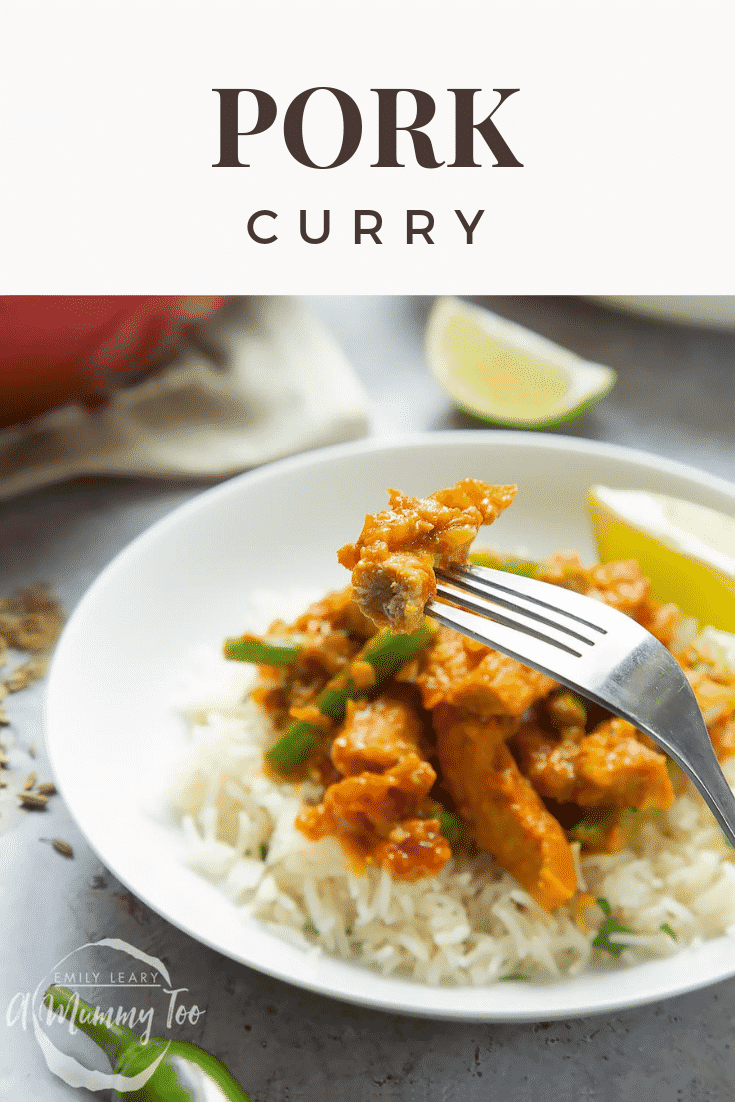
Visit lovepork.co.uk for more pork recipe inspiration if you'd like to print this coconut-pork curry recipe to try later, just hit PRINT on the recipe card below.
Print this pork curry recipe
Pork Curry Recipe (Keralan Pandi)
Ingredients
- 750 g (1½ lb) pork loin steak or fillet room temperature
- 2 tbsp vegetable oil (canola oil) or coconut oil
- 1 tsp fennel seeds leave out, if preferred
- 2 dried red chillies remove, if preferred
- 2 onion finely diced
- 5 cloves (5) garlic minced
- 1 pinch sea salt flakes
- 1 pinch freshly ground black pepper
- 1 tsp ground turmeric
- 400 g (14 oz) canned chopped tomatoes
- 1 fresh green chilli chopped
- 1 tbsp fresh root ginger grated
- 2 tsp ground cumin seeds or cumin powder
- 1 tsp ground coriander or coriander powder
- 200 g (7 oz) canned coconut milk low fat, if preferred
- 100 g (3.5 oz) green beans trimmed
- 1 handful fresh coriander (cilantro) leaves only, chopped
- 1 lime
Instructions
- Place a wide, large saucepan or large frying pan over a medium heat and add the oil. Once hot add the whole fennel seeds and red chillies (if you are using them).
- Add the onions and sauté until they start to brown. You'll probably need to lower the heat to ensure they brown gently rather than stir fry.
- Remove the fat from the pork and cut into strips. Season the pork with salt and lots of black pepper and ½ tsp turmeric.
- Add the tinned tomatoes, green chilli, grated ginger into the pan with the onions and stir over a medium-high heat.
- Once it starts to simmer, add the remaining turmeric, ground cumin and coriander and stir. Let it reduce and thicken.
- Add the meat and stir to coat with the sauce. Reduce the heat and cook for 5-10 minuets.
- Pour in the coconut milk and heat through then add the trimmed beans and cook for a further 5-10 minutes until the beans are cooked.
- When cooked through, check the seasoning and add the coriander leaves (fresh cilantro leaves), and a squeeze of lime. Serve with plain rice.
Video
Nutrition
Yum! What do you think of this warming curry?
This is a commissioned post for Love Pork
Fancy some more tasty dishes with a little spice?
Have you got my book?

'This is a great kids cookery book. Emily is a star' - Simon Rimmer
'The book I'd like to force into any mother's kitchen' - Prue Leith
"A fab book with a plan." - Jane Devonshire, 2016 Masterchef UK winner
'Emily has managed to combine her mummy knowledge and passion for food to make a truly helpful and brilliant cookbook' - Priya Tew, RD, BSc (Hons), Msc
Get Your Kids to Eat Anything is an achievable 'how to' for parents in the battle to overcome picky eating and 'make new the norm'. Emily Leary's unique 5-phase programme looks at the issue of 'fussy eating' in a holistic way that links imagination with food, and which situates parents alongside - not in opposition to - their children.
.



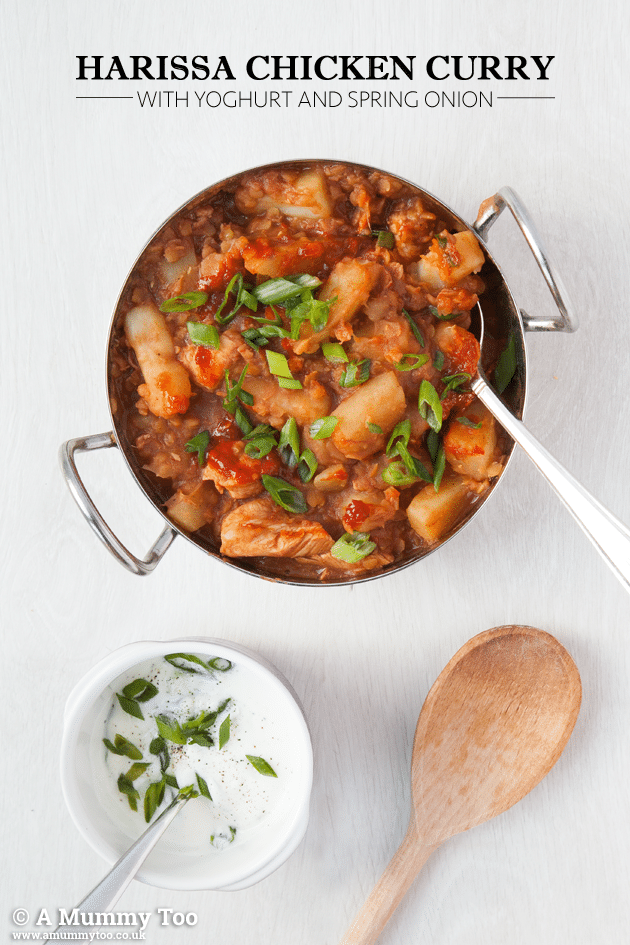
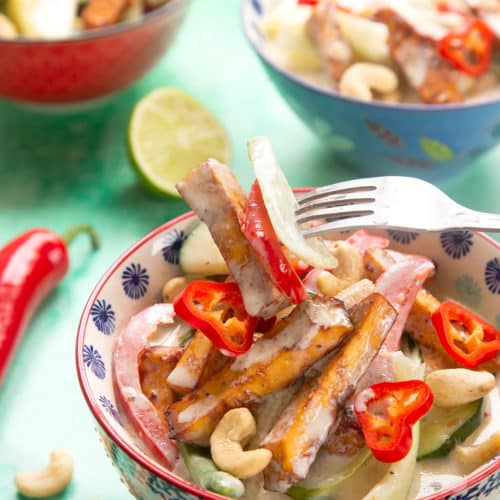
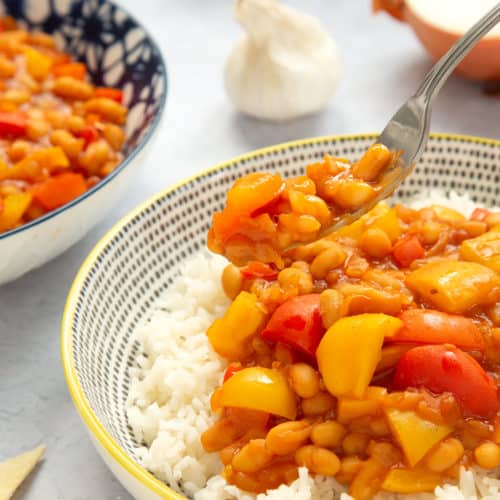
Anna says
Wow! your post made me so hungry haha going to try this tonight for dinner thanks for the idea!
Emily Leary says
Hehe, that's the goal! I hope you got a chance to make and enjoy it.
Sania Ahmed says
Now a days I am falling for these coconut curry taste, this seems to be a great recipe to try ... thanks for sharing :)
Emily Leary says
Thank you - yes it's really delicious.
lauren says
Your photos are so vivid and beautiful! Love all the process shots. It makes the dish look even more drool worthy.
Emily Leary says
Thank you so much!
Kara says
I don;t think I have ever made a curry with pork, it looks delicious
Emily Leary says
It shows how versatile pork can be, doesn't it! I hope you get a chance to try it.
Prashant says
Looks great. I am vegetarian :) so, I will have to give it a pass. But your style of presenting is great.
Emily Leary says
Thank you - I really enjoy sharing recipes and tips on camera and Hari was great to work with.
Debbie says
That looks so nice. Easy too!
Emily Leary says
Thanks!
Rachael says
Looks so easy to do, I love how you explain the stepsvwoth pictures all the way through. It makes learning a new recipe so much easier.
Emily Leary says
Thanks so much, Rachel!
Tania says
OMG cant believe i finally found this recipe! Ive been searching for ages and this finally seems legit! Thanks for sharing ill be trying this tomorrow
Emily Leary says
Yay! I hope you got a chance to make it and that you enjoyed it!
StuartBrazell says
I am such a fan of Curry I think it always hits the spot especially if I'm craving something with some extra special flavor
Emily Leary says
Yes me too! Curry for the win!
Jojo Hua says
This sounds incredible and looks so delicious. I already love Thai green curry for it's coconut taste, so I'm sure I'd love this too.
Emily Leary says
Yes I'm sure you would love it!